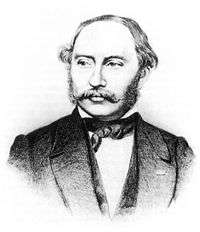Friedrich Bürklein
Georg Friedrich Christian Bürklein (30 March 1813 – 4 December 1872) was a German architect and a pupil of Friedrich von Gärtner.[1]
Friedrich Bürklein | |
|---|---|
 Portrait of F. Bürklein | |
| Born | 30 March 1813 |
| Died | 4 December 1872 (aged 59) |
| Resting place | Alter Südfriedhof, Munich |
| Nationality | German |
| Occupation | Architect |
Biography
He was born in Burk, Middle Franconia. His first important work was the construction of the town hall in Fürth[1] (1840–50) which is influenced by the Palazzo Vecchio in Florence.
Bürklein created also the Hauptbahnhof in Munich (1847–1849) with its steel construction and the stations of Augsburg, Bamberg, Ansbach, Neu-Ulm, Hof, Nördlingen, Rosenheim, Würzburg, Nuremberg and Bad Kissingen.
From 1851 Bürklein was the chief architect of the royal Maximilianstraße in Munich with all its state buildings including the Maximilianeum. Its Neo-Gothic architecture was influenced by the Perpendicular style and was strongly disputed. Before the Maximilianeum was finished Bürklein was replaced by Gottfried Semper. The sensitive Bürklein died mentally deranged in the sanatorium of Werneck. He is buried in the Alter Südfriedhof in Munich.